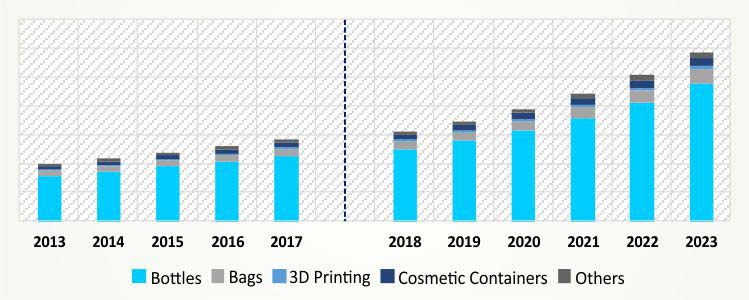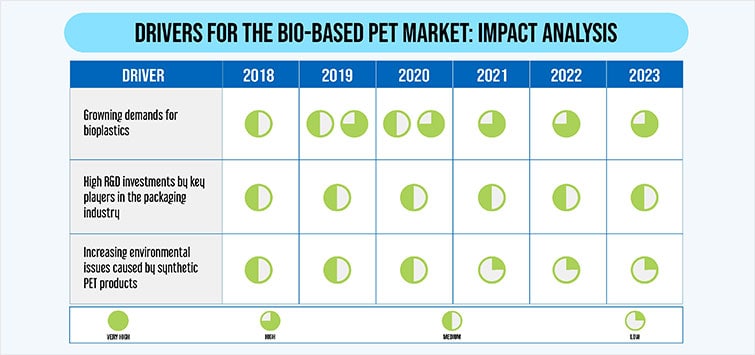Report Code: 11398 | Available Format: PDF | Pages: 123
Bio-Based Polyethylene Terephthalate (PET) Market by Application (Bottles, Bags, 3D Printing, Cosmetic Containers), by Industry (Packaging, Automotive, Electronics, Textile), by Geography (U.S., Canada, Germany, U.K., France, Italy, Spain, China, India, Thailand, Japan, Australia, Brazil, Mexico, Saudi Arabia, South Africa) - Global Market Size, Share, Development, Growth, and Demand Forecast, 2013-2023
- Report Code: 11398
- Available Format: PDF
- Pages: 123
- Report Description
- Table of Contents
- Market Segmentation
- Request Free Sample
Bio-Based PET Market Overview
The global bio-based PET market is estimated to be valued at $3,917.4 million in 2017 and is projected to witness a CAGR of 14.7% during the forecast period. The growing use of bio-based PET in various industries such as packaging, automotive, electronics, textile, medical, and horticulture is a major factor driving the growth of the market.
GLOBAL BIO-BASED PET MARKET, BY APPLICATION, KILOTONS (2013-2023)

Bio-based PET is a biomass-derived fully recyclable, biodegradable, compostable, and renewable bioplastic material. The material is composed of 30% plant-derived ethanol glycol and 70% fossil-derived terephthalic acid (TPA).
On the basis of application, the bio-based PET market is categorized into bottles, bags, 3D printing, cosmetic containers, and others. Other applications include trays, blister packs, carpets, sanitary products, and foils. In terms of volume and value, bottles were the largest application area of bio-derived PET during the historical period. They are estimated to hold more than 75.0% share in terms of volume and more than 70.0% share in terms of value in the market in 2017. This can be attributed to the growing use of bio-derived PET as a packaging material in bottles.
Based on industry, the bio-based PET market is categorized into packaging, automotive, electronics, textile, and others. Other industries include medical and horticulture. During the forecast period, the market is expected to witness the highest growth in the automotive industry, at CAGRs of 16.4% and 16.7% in terms of volume and value, respectively. Increasing demand for eco-friendly automotive products, such as seat covers, dashboard components, battery cases, and vehicle covers, on account of growing concerns regarding greenhouse gas (GHG) emissions and decomposability is driving the use of bio-derived PET in the automotive industry, globally.
Asia-Pacific (APAC) is expected to continue holding the largest share in the bio-based PET market in the coming years; it is also anticipated to be the fastest-growing market during the forecast period. In terms of value, the market in the region is expected to grow at a CAGR of 15.5% during the forecast period. Increasing bio-derived PET production capacity by key players in China and India is a major factor driving the market growth in APAC. In addition, high consumption of alcohol beverages and fizzy soft drinks is driving the market in the region.
Bio-Based PET Market Dynamics
The major trend identified in the bio-based PET market is surge in strategic alliances by key players. Besides, growing demand for bioplastics is a key factor driving the market growth.
Trends
Key players in the bio-based PET market are entering into strategic alliances in order to cater to the growing demand for sustainable packaging products. For instance, in 2017, two largest bottled water companies in the world, Danone and Nestlé Waters (water division of Nestlé SA), entered into an alliance called “NaturALL Bottle Alliance” with Origin (a start-up based in the U.S.). With this alliance, the three partners aimed at developing and commercializing a 100% renewable PET plastic bottle at a large scale. Thus, strategic alliances by key manufacturers in the packaging industry are a major trend witnessed in the market.
Drivers
Bioplastics are the materials derived from a plant source that can be broken down by microorganisms into water, naturally occurring gases, and biomass. Bio-derived PET, polylactic acid (PLA), polybutylene succinate (PBS), starch-based plastics, and polyolefin elastomer (PE) are examples of bioplastics. The demand for these bioplastics is on the rise owing to their several advantages over fossil-based packaging materials. As compared to fossil-based plastics, bioplastics provide longer shelf life, higher breathability (essential for the packaging of vegetables and fruits), and better compostability and renewability. Hence, owing to these advantages, the demand for bioplastics is growing in the bio-based PET market, globally.

Restraints
Bio-based materials, such as bio-fuels and bioplastics, are economically costly. This is a major factor hindering the growth of the bio-based PET market. Owing to the high production cost of bioplastics, only 2% of the world’s 300 million tons of plastic production comes from plant sources. However, bio-based material manufacturers are constantly working on reducing the price of bio-based materials and replacing fossil-based plastics with them. Hence, it is estimated that most of the global plastic production over the next 20 years would come from plant-based materials.
Bio-Based PET Market Competitive Landscape
Some of the major players operating in the global bio-based PET market are The Coca-Cola Company, PepsiCo Inc., Toyota Tsusho Corporation, M&G Chemicals SA, Origin, Ford Motor Company, Braskem, and Teijin Limited.
.jpg)
Want a report tailored exactly to your business strategy?
Request CustomizationWant an insight-rich discussion with the report author?
Speak to AnalystOur dedication to providing the most-accurate market information has earned us verification by Dun & Bradstreet (D&B). We strive for quality checking of the highest level to enable data-driven decision making for you
Our insights into the minutest levels of the markets, including the latest trends and competitive landscape, give you all the answers you need to take your business to new heights
With 24/7 research support, we ensure that the wheels of your business never stop turning. Don’t let time stand in your way. Get all your queries answered with a simple phone call or email, as and when required
We take a cautious approach to protecting your personal and confidential information. Trust is the strongest bond that connects us and our clients, and trust we build by complying with all international and domestic data protection and privacy laws